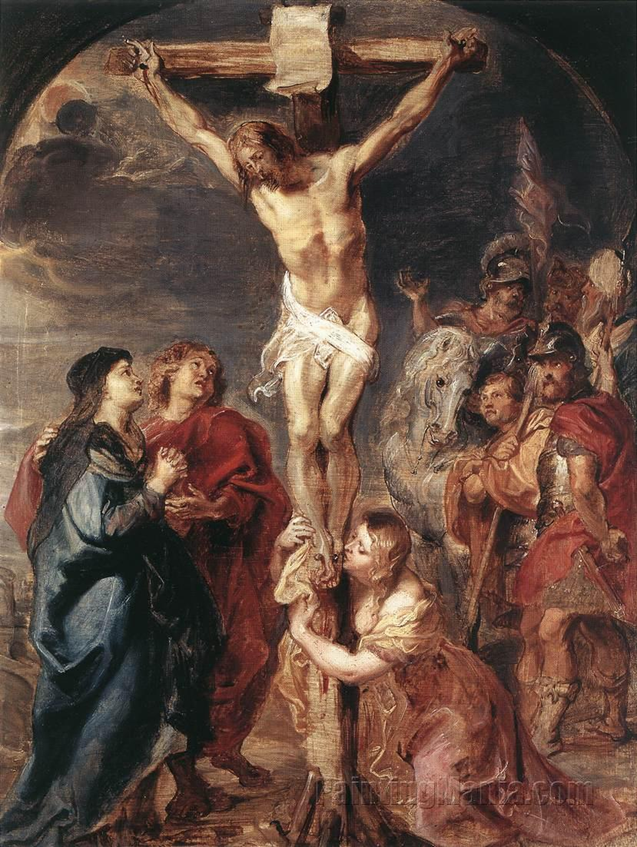Jesus often spoke about forgiveness, forgave those who sinned against others, forgave those who sinned against him, and asked the Church to continue his healing ministry. Jesus taught, “If you forgive others their transgressions, your heavenly Father will forgive you” (Mt 6:14). Peter asked Jesus how often it is necessary to forgive, and Jesus replied, “Seventy-seven times” (Mt 18:22), a number to be taken symbolically, not literally, for the never-ending way that we ought to forgive.
Jesus liked to use parables to illustrate various aspects of forgiveness. During his conversation with Peter, Jesus told the parable of the unforgiving servant (Mt 18:23-35). Luke’s gospel has a series of five forgiveness parables: the barren fig tree (Lk 13:6-9); the bent over woman (Lk 13:10-13); the lost sheep (Lk 15:4-7); the lost coin (Lk15:8-10); and the greatest forgiveness parable of all, the prodigal son (Lk 15:11-32).
Jesus was extremely kind and merciful in the way that he forgave those who sinned against others. Jesus told the paralytic, “Child, your sins are forgiven” (Mk 2:5); when a sinful woman bathed Jesus’ feet with her tears and wiped them with her hair, Jesus said, “Your sins are forgiven” (Lk 7:48); when a woman caught in adultery was brought before him, he said, “I do not condemn you” (Jn 8:11); and as Jesus hung on the cross he told the repentant criminal, “Today you will be with me in paradise” (Lk 23:43).
Even more compelling is the way that Jesus forgave those who sinned against him directly. For Jesus, forgiveness was not an automatic, it was intentional, a conscious choice. After the Roman soldiers had scourged and nailed him, Jesus prayed, “Father, forgive them” (Lk 23:34). After the resurrection Jesus had every right to be furious. Peter had denied him. The others had deserted him. When he entered the Upper Room, they deserved a severe reprimand, but instead, with divine compassion Jesus said not once but three times, “Peace be with you” (Jn 20:19,21,26).
Jesus asked his disciples to continue his forgiveness ministry. Jesus told Peter, “I will give you the keys to the kingdom of heaven. Whatever you bind on earth shall be bound in heaven; and whatever you loose on earth shall be loosed in heaven” (Mt 16:19); and after the resurrection Jesus breathed on the disciples and said, “Receive the Holy Spirit. Whose sins you forgive are forgiven them” (Jn 20:22,23).
Lots of people treat forgiveness as a form of therapy. It’s a way of moving on. It’s a form of personal healing. This is not what Jesus taught. Jesus taught us to forgive as we have been forgiven. We let sinners get away with their sin, because God has let us get away with our sin. We naturally prefer justice to mercy, unless we are on the receiving end.
I have heard people say things like, “I forgive, but so and so still needs to pay for their sin”; “I forgive, but they have to deal with the consequences”; “I forgive, but I will never let them forget”; and “I forgive, but they had better show themselves worthy of forgiveness.” This is not what Jesus taught.
When Jesus taught his disciples to pray, he taught them to request that the Father “forgive us our debts as we forgive our debtors” (Matt. 6:12). This prayer captures something significant about being a Christian. We live by faith under grace and act out of grace. We are free to forgive in the way the rest of the world is not. We can act in mercy because God has carried out justice in Jesus’ life and death for us.
God declared that all who sin will die, both physically and spiritually. This is the fate of all mankind. But God, in His grace and mercy, provided a way out of this dilemma, the shed blood of His perfect Son on the cross. God declared that “without the shedding of blood, there is no forgiveness” (Hebrews 9:22), but through the shedding of blood, redemption is provided. The Law of Moses provided a way for the people to be considered “sinless” or “right” in God’s eyes—the offering of animals sacrificed for every sin they committed. These sacrifices were only temporary, though, and were really a foreshadowing of the perfect, once-for-all sacrifice of Christ on the cross (Hebrews 10:10).
This is why Jesus came and why He died, to become the ultimate and final sacrifice, the perfect (without blemish) sacrifice for our sins (Colossians 1:22; 1 Peter 1:19). Through Him, the promise of life eternal with God becomes effective through faith to those who believe in Jesus. “So that what was promised, being given through faith in Jesus Christ, might be given to those who believe” (Galatians 3:22). These two words, faith and believing, are critical to our salvation. It is through our believing in the shed blood of Christ for our sins that we receive eternal life. “For it is by grace you have been saved, through faith—and this not from yourselves, it is the gift of God—not by works, so that no one can boast” (Ephesians 2:8–9).

 RSS Feed
RSS Feed
























































